How to search the page
iOS Safari – tap the action icon (square with arrow at bottom of screen) and select ‘find on page’ from the list of options.
Other mobile browsers – tap the browser’s options menu (usually 3 dots or lines) and select ‘find on page’ from the options.
CTRL + F on your keyboard (Command + F on a Mac)
This will open a search box on the page. Type the word you are looking for in the search box and press enter. The word will then be highlighted wherever it appears in the guidance. Use the navigation in the search box to move to the next word found.
How to print a copy of the page
iOS Safari – tap the action icon (square with arrow at bottom of screen) and select ‘print’ from the list of options.
Other mobile browsers – tap the browser’s options menu (usually 3 dots or lines) and select ‘print’ or select ‘share’ from the list of options, then ‘print’ in the popup.
CTRL + P on your keyboard (Command + P on a Mac)
You have an option to print the entire page, or select a page range.
Summary
Adult day care services support adults to maintain their independence and enable them to continue living in their own home. Typically these are non-residential settings that support individuals' needs around health, nutrition, social, and daily living needs in a professionally staffed, group setting, typically involving planned activities.
There are six adult day care services delivered in Blackpool, at present four of these services are commissioned contracts delivered by two local providers and the remaining two are in-house services delivered by Blackpool Council. The Council provides day care services for those with moderate to high learning disability and dementia needs through their in-house teams, with the market providing the care for the remaining areas of need.
Blackpool is experiencing a decrease in overall demand for day care services, for older adults and service users with low to moderate support needs, following the pandemic. Reasons for this may include, but are not limited to, heightened anxiety from service users and their families in attending day services, service users adapting to new ways of doing things or replacing day care with other things in their lives, social work teams not referring into day support services on a consistent basis and post-pandemic hybrid working options allowing more people the opportunity to visit and support vulnerable family members more consistently; negating the need for daytime support.
In contrast, day services that support people with complex Learning Disability and Autism have seen an increase in demand. This is evidenced as an increase in both the number of people accessing the service and the needs of existing service users that require additional hours of support. This also corresponds with feedback from our social work teams who have identified that overall service users' health deteriorated during the pandemic.
Previously demand for day care has increased in line with the overall population needs, however since the pandemic this has not been the case and predicting future levels of demand has therefore become more difficult to accurately forecast. In contrast to anticipated increases in the levels of need across the population, adult day care services have seen a post pandemic decrease in demand. Blackpool's population data (below) shows an annual increase in both our older adults and learning disability community, with day care referral rates and demand increasing year upon year prior to the pandemic.
Blackpool Council have recently introduced a procurement framework for older adult, learning disability and autism day care (for service users with low to moderate support needs). Blackpool Council is able to re-open the framework at ad-hoc intervals to increase levels of provision depending on future demand.
At present, adult day care provision in Blackpool is sufficient in meeting demand and whilst there may be growth in this area over the coming years, the market remains unpredictable and therefore no significant additional provision is required at this time.
Introduction
Blackpool's population profile
Blackpool has an estimated population of 139,445 people, with a larger than average proportion of people aged 65+ people (20.8%) as compared to the national average (18.4%).
Blackpool is one of the most deprived boroughs in England by rank of average score, across the health, deprivation, disability and employment domains. 42% of lower super output areas (geographic areas of around 1,500 residents) are in the most deprived 10% of areas in England and currently life expectancy across the borough is the lowest amongst men and women across the UK.
Projections from the Institute of Public Care estimate, from their Projecting Older People Population Information (POPPI) and Projecting Adult Needs and Service Information (PANSI) information services, the current populations of supported housing client groups as of 2020 are as follows:
Learning disability
People with learning disabilities currently make up around 2% of all residents in Blackpool, this figure is similar to the national picture where it is an estimated 2.16% (for adults). In Blackpool, over 20% of those with a learning disability having a moderate or severe learning disability and just under a quarter of those with a learning disability aged over 65 years. POPPI/PANSI projections by condition and age category is shown in the table below:
- Total population aged 18 to 64 predicted to have a learning disability - 1,976
- Total population aged 65 and over predicted to have a learning disability - 598
- Total population aged 18 to 64 predicted to have a moderate or severe learning disability - 448
- Total population aged 65 and over predicted to have a moderate or severe learning disability - 80
- Total population aged 18 to 64 predicted to have Down's Syndrome - 51
- Total population aged 18to 64 predicted to have Autistic Spectrum Disorders - 821
- Total population aged 65 and over predicted to have Autistic Spectrum Disorders - 268
Mental health
There are approximately 15,374 people in Blackpool living with common mental disorders (nearly 19% of the estimated working age population). Although, the majority of people in this group are unlikely to require supported housing and will live independently in the community. Common mental health problems include problems such as anxiety, depression, phobias, obsessive compulsive and panic disorders.
- People aged 18 to 64 predicted to have a common mental disorder - 15,374 (19%)
- People aged 18to 64 predicted to have a Borderline Personality Disorder - 1,953 (2.4%)
- People aged 18 to 64 predicted to have an Antisocial Personality Disorder - 2,741 (3.4%)
- People aged 18 to 64 predicted to have a psychotic disorder - 571 (0.7%)
- People aged 18 to 64 predicted to have two or more psychiatric disorders - 5,866 (7.2%)
- Total males aged 30-64 predicted to have early onset dementia - 24
The Common Mental Health Disorders Profile developed by the Office for Health Improvement & Disparities (OHID) illustrates that the prevalence of depression, both identified by GPs and self-reported within the GP patient survey, is significantly higher in Blackpool than the England average. In the 2021 GP Survey, 15% of Blackpool patients self-reported having a mental health condition.
For 2021/22 Blackpool's GP diagnosed depression rates were the highest in the country at 20.6% (up from 19.8% in 2020/21), significantly higher than the national average of 12.7%. There were 3,333 new diagnoses of depression recorded on GP practice disease registers in Blackpool in 2021/22, 2.3% of the GP registered population. This is a reduction from 2018/19 when the rate was 2.7%. Across England the rate of new diagnoses was 1.5% (down from 1.7% in 2018/19).
Public health population projections 2016 to 2041
Blackpool's population pyramid for 2020 shows that there is a higher proportion of people aged over 49 years of age than there is when compared to the rest of England and a much lower proportion of people aged younger than 45. The age bands 20-44, in particular, have a considerably lower proportion than England. This shows that Blackpool has an older than average population when compared against other areas of the country. In all age ranges from 50 to 80 years old Blackpool exceeds the national average, in both males and females. This is particularly true for the age ranges between 50 and 65. This cohort will be entering 'old age' within the next 20 years and will be the people more likely to require day care services in the coming years.
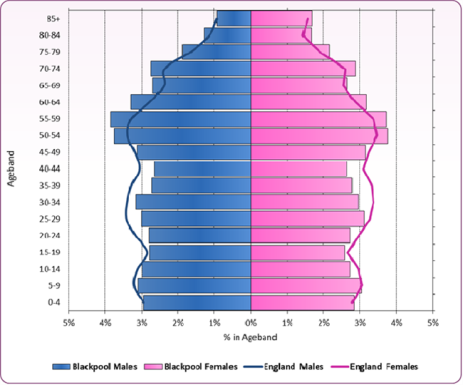
The Office of National Statistics predicts that the overall population of Blackpool will gradually increase over the next 20 years, going from 139,300 in 2018 to 141,500 in 2044. Projections predict that there will be a considerable increase in the proportions of residents aged above 65. The over 65 population is projected to rise by 24% from 28,400 in 2018 to almost 36,000 in 2039. This will mean that the over 65's will make up over a quarter (26%) of Blackpool's total population. Looking at the shorter term it is predicted that the proportion of those aged over 65 will increase by 7% between 2020 and 2025 (from 28,000 to 30,000). And the same population will have increased by 18% by 2030 (from 28,000 to 33,000).
The chart below shows how the age ranges are predicted to change in Blackpool over the next 20 years.
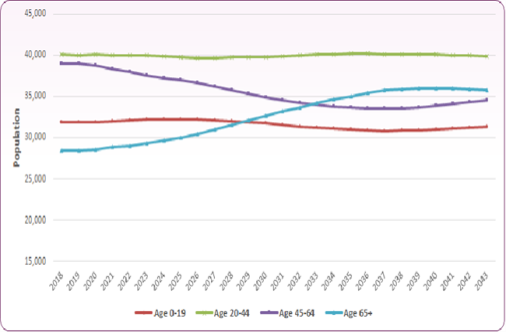
1. Local market
There are six adult day care services delivered in Blackpool, at present four of these services are commissioned contracts delivered by two local providers and the remaining two are in-house services delivered by Blackpool Council.
Current day care provision
| | Day care provision | Description | Contract status |
|---|
|
Low to moderate support needs
|
Commissioned provider 1 - Older adults
|
Building based day time support service for older adults
|
Flexible framework due to expire 30 June 2026, with option to extend incrementally to June 2030.
The council will review the framework periodically.
|
|
Commissioned provider 1 - Learning disabilities
|
Learning disability daytime support service
|
Flexible framework due to expire 30 June 2026, with option to extend incrementally to June 2030.
The council will review the framework periodically.
|
|
Commissioned provider 2 - Autism and learning disabilities
|
A worked-based day service for adults with either Autism Spectrum Disorder (ASD) or a dual diagnosis of ASD and learning disabilities.
|
Direct award contract on an ongoing basis.
|
|
Moderate to high support needs
|
Commissioned provider 2 - Autism and learning disabilities
|
Adult Autism day service for adults with either Autism Spectrum Disorder (ASD) or a dual diagnosis of ASD and learning disabilities
|
Direct award contract on an ongoing basis.
|
|
Blackpool Council service 1 - Older adults with dementia
|
Providing day centre support to adults with a diagnosis of dementia related illness who have complex and challenging behaviour.
|
In house Blackpool Council service
|
|
Blackpool Council service 2 - Learning disabilities
|
Both a community and building based daytime activity service for adults with a learning disability
|
In house Blackpool Council service
|
In addition to the above providers, there are also several new day care providers in Blackpool and surrounding areas. Service users are able to access these services by paying privately or by opting for direct payments.
2. Capacity and demand
At present there are 993 adult day care sessions commissioned each week by Blackpool and these are accessed by 402 people (figures relate to May 2023).
*One session = one full or partial days attendance (depending on the service and those attending).
Details of provision
| Day care provision | Number of service users | Total sessions provided (Weekly) | Number of Blackpool funded sessions (Weekly) | Number of private and out of area funded sessions (Weekly) | Available sessions (Weekly) |
|---|
|
Older adults (low to moderate support needs)
|
145
|
294
|
203
|
91
|
350
|
|
Learning disabilities (low to moderate support needs)
|
72
|
158
|
111
|
47
|
200
|
|
Autism and learning disabilities (low to moderate support needs)
|
24
|
84
|
51
|
33
|
N/A (service able to grow as demand requires)
|
|
Autism and learning disabilities (moderate to high support needs)
|
35
|
155
|
99
|
56
|
N/A (service able to grow as demand requires)
|
|
Older adults with dementia (moderate to high support needs)
|
27
|
55
|
55
|
0
|
120
|
|
Learning disabilities (moderate to high support needs)
|
78
|
204
|
202
|
2
|
218
|
All our day services have available capacity which can expand further with the option to provide a flexible out and about type of day support in addition to the buildings based day services.
At present there are currently 135 staff members in total across Blackpool's day care services, with only 1 vacancy across all of those services.
Pattern of demand
Chart A below, displays the number of service users in total accessing day services from 2017 to 2023.
Chart A
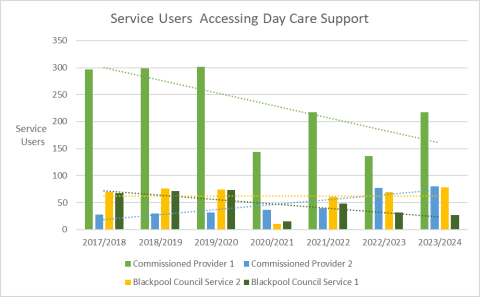
The Autism Day Services (Commissioned Provider 2) have seen an overall increase in demand and this does correlate with both an increase in autism diagnoses, but also with the introduction of our Blackpool Autism Social Work Team who are actively referring into this day service. The Autism Day Service provider also reports that they have done further work recently with regards to service users transitioning from children's to adults' services.
Demand for Blackpool Council service 2 (moderate to high level learning disabilities) have remained fairly steady with a slight drop in the height of the pandemic (2020/21).
Both commissioned provider 1 and Blackpool Council service 1 offer day service support to older adults in Blackpool. Providers have suggested that the decrease in demand for older adult's day care has been significant and this is further supported by the information displayed in Chart A.
Blackpool's population data listed above describes an increase in both the elderly population and the Learning Disability population. It was predicted that demand for older adult day care services would increase year upon year, however the figures indicate that day service demand for older adults is not as substantial as it has been previously.
Feedback from social work teams and providers would suggest that there are a number of reasons contributing to this including; heightened anxiety from service users and their families in attending day services, service users adapting to new ways of doing things or replacing day care with other things in their lives, and social work teams not referring into day support services as they previously did due to not having this option in the height of the pandemic. One social worker also suggested that the food and energy price hikes might also create a reluctance from older adults to attend day services due to the possibility of having to contribute financially.
*Please note the figures in the chart displayed are a snapshot, service user figures do fluctuate, but the snapshot allows us to look at annual patterns and trends.
Location
The locations of our adult day care services across Blackpool:
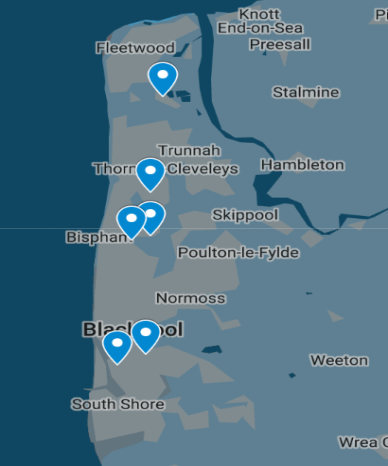
It is important to note that all our day care services are able to provide an out and about/flexible day service provision and therefore not all our day care is buildings based or in 1 specific location.
3. Delivery
Infection prevention and public health measures
Post Covid, the majority of day services have taken away any social distancing measures with only a few services still utilising PPE.
Providers have indicated that all staff member Covid vaccination status is recorded. Staff members are encouraged to keep up to date with vaccines and this is documented accordingly.
Challenges
Providers have reported a number of ongoing challenges and these vary depending on the service and how it is delivered but some of the key challenges are as follows:
Day centres' by nature require a substantial infrastructure in terms of buildings and transport. The price cap that benefits domestic users for utilities does not apply to commercial contracts. One provider specifically reported that all consumables have increased dramatically, which affects food costs, petrol/diesel, cleaning products, equipment etc. This results in an increased cost per day care session and affects a day care provider's overall financial position.
Due to the Covid pandemic, and now post-pandemic, we are not always seeing the expected patterns of demand that were predicted (demand predictions based on previous growth/decline patterns and JSNA data).
Blackpool's older adults' day services have seen a drop in demand which was not predicted and at this moment it is unknown whether demand in this sector will increase and at what rate it will do so. Social workers have provided feedback that states on one hand we may see an increase in referrals for day support due to the rise of energy and food costs and the health impacts this will have on people (accessing day services means somewhere warm with food,) but on the other hand some adults may be reluctant to explore day services due to anxiety around money and the possibility of having to contribute to their day care costs.
Our learning disability day services appear to have had a consistent number of service users (excluding the height of the pandemic) but one provider has reported that demand has increased significantly for those with complex support needs. In addition to an increased number of referrals, providers of day care for those with complex learning disability and autism report that the support needs of existing service users has also changed; due to health deterioration, an increased level of support is now required.
Demand for using day services as carers respite varies across each service, with one service seeing a high demand for this and all other day services experiencing very little demand. At present, Blackpool are developing a new carer's strategy and the respite support on offer through day care services will be considered within this to ensure carers are fully aware of all the respite options available to them.
Transport
Feedback from social work teams suggests that day care transportation is very important, as the majority of service users with eligible needs would be unable to access day care provision without it. The table below confirms that high numbers of service users utilise the transport on offer, and in the majority of cases this is paid for by the service user themselves. When commissioning any future day services transport will need to be given appropriate consideration to ensure accessibility.
Support services
| Day support setting | Transport | How many access this | Who pays for transport |
|---|
|
Commissioned provider 1 - Older adults
|
Provider has 5 vehicles, and there are 2 Blackpool Transport vehicles also provided alongside 2 Rideability vehicles
|
96% of service users who attend access the transport provision
|
Transport is not included in the fee for commissioned service users, similar to food and drinks. Transport for older adults is £5 per day and for LD £2 per day if they have an orange NOW card.
|
|
Commissioned provider 1 - Learning disabilities
|
Provider has 5 vehicles, and there are 2 Blackpool Transport vehicles also provided alongside 2 Rideability vehicles.
|
96% of service users who attend access the transport provision
|
Transport is not included in the fee for commissioned service users, similar to food and drinks. Transport for older adults is £5 and for LD £2 if they have an orange NOW card.
|
|
Commissioned provider 2 - Autism
|
Yes
|
28%
|
This transport has been agreed with social workers or stakeholders on a needs basis and can be individually assessed.
|
|
Commissioned provider 2 - Autism
|
Yes
|
25%
|
This transport has been agreed with social workers or stakeholders on a needs basis and can be individually assessed.
|
|
Blackpool Council service 1 - Older adults with Dementia
|
Yes
|
89%
|
Service users themselves/ carers families pay for this £3 each journey
Monthly bills sent out to families/carers to pay direct to provider.
|
|
Blackpool council service 2 - Learning disabilities
|
The Blackpool transport team provide transport
|
88%
|
£3.00 per journey and invoices are sent to carers or POA (power of attorney).
|
4. Financial information
Annual spend
Annual spend
| 2020/2021 | 2021/2022 | 2022/2023 |
|---|
|
£2,589,235.81
|
£2,672,118.33
|
£2,900,973.03
|
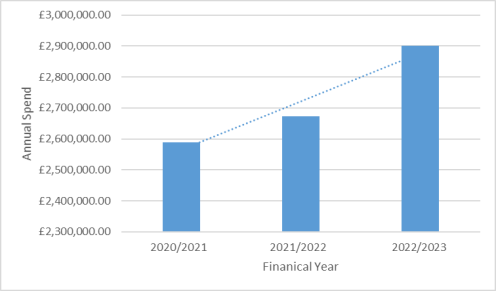
Spend on adult day services currently represents 4% of the overall adult social care budget. However, this excludes a small proportion of the day care which is funded by adult social care and the Better Care Fund.
Fee rates for commissioned services
free rates
| Service | 2022/2023 | 2023/2024 | Percentage increase |
|---|
|
Older adults and LD (RLW)
|
£40.06
|
£43.89
|
9.65%
|
|
Older adults and LD (NLW)
|
£38.75
|
£42.34
|
9.26%
|
|
Autism day service (access rate with 1to1 support**)
|
£53.40
|
£57.88
|
8.39%
|
|
Autism day service (access rate without 1to1 support)
|
£84.69
|
£91.80
|
8.4%
|
** Additional 1to1 hours are purchased on top of the £57.88 at a rate of £ per hour.
5. Quality
What we want from our day service providers:
- Collaborative approaches with service users and carers about how the service is delivered and the activities available
- Strong communication links with family members and/or carers where possible
- Compliance with the Ethical Care Charter
- Commitment to paying the real living wage
- Collective approaches to the recruitment and retention of care staff
- To ensure that mandatory training is readily available, easily accessible and completed by staff
- To ensure compliance with infection control measures including mandatory vaccinations
- Open dialogue and collaborative approaches to business continuity, financial stability, contingency planning and social value including environmental sustainability
- To ensure providers maintain and improve upon standards
Blackpool Council is currently developing a set of non-regulated care standards to support the quality monitoring of day care provision.
Future provision:
Regular reviews of nature and levels of demand and capacity will ensure any unmet needs can be identified and additional capacity secured either through existing or additional procurement mechanisms.